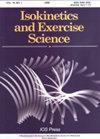Hip and ankle strength and range of motion in female soccer players with dynamic knee valgus
IF 0.7
4区 医学
Q4 ENGINEERING, BIOMEDICAL
引用次数: 0
Abstract
BACKGROUND: Dynamic knee valgus (DKV) is a known risk factor for acute and chronic knee injuries and is more frequently diagnosed in females. A real-time single-leg squat test (SLST) could screen for DKV to prevent injuries. OBJECTIVE: To compare the differences in lower extremity strength and range of motion (ROM) in female soccer athletes with and without DKV during an SLST. METHODS: Eighteen subjects with DKV (DKV group) and 18 subjects without DKV (control group) during a single-leg squat were included. Hip strength (flexion, extension, abduction, adduction, internal rotation, and external rotation) was measured with a hand-held dynamometer. Hip ROM (internal and external rotation), and ankle ROM (dorsiflexion with the knee flexed and extended) were measured. Independent t-test was used to compare the averages of the groups. RESULTS: There were significant differences in hip abduction to adduction strength ratio (DKV: 1.48 ± 0.3, control: 1.22 ± 0.26, p< 0.01) and ankle dorsiflexion with knee flexed (DKV: 17.22 ± 6.82, control: 21.22 ± 4.55, p< 0.05) and extended (DKV: 10.14 ± 4.23, control: 14.75 ± 3.40, p< 0.001) between the groups. CONCLUSION: The hip abduction to adduction strength ratio and gastrocnemius and soleus flexibility may be associated factors in dynamic knee valgus and therefore should be assessed and treated, if indicated, as a possible preventive measure in female athletes with this variation.女足球运动员动态膝外翻的髋关节和踝关节力量和活动范围
背景:动态膝外翻(DKV)是一种已知的急性和慢性膝关节损伤的危险因素,在女性中更常见。实时单腿深蹲测试(SLST)可以筛查DKV,以防止受伤。目的:比较有DKV和无DKV的女子足球运动员在SLST中下肢力量和活动范围(ROM)的差异。方法:纳入18名DKV受试者(DKV组)和18名无DKV受测者(对照组)在单腿深蹲过程中。用手持式测功机测量髋关节力量(屈曲、伸展、外展、内收、内旋和外旋)。测量髋关节ROM(内旋和外旋)和踝关节ROM(膝关节屈曲和伸展的背屈)。使用独立t检验来比较各组的平均值。结果:两组髋关节外展内收强度比(DKV:1.48±0.3,对照组:1.22±0.26,p<0.01)和踝关节背屈伴膝关节屈曲(DKV:12.22±6.82,对照组21.22±4.55,p<0.05)和伸展(DKV:10.14±4.23,对照组14.75±3.40,p<0.001)存在显著差异。结论:髋关节外展内收力量比和腓肠肌和比目鱼肌灵活性可能是动态膝外翻的相关因素,因此,如果有必要,应评估和治疗,作为女性运动员这种变异的可能预防措施。
本文章由计算机程序翻译,如有差异,请以英文原文为准。
求助全文
约1分钟内获得全文
求助全文
来源期刊

Isokinetics and Exercise Science
医学-工程:生物医学
CiteScore
1.20
自引率
14.30%
发文量
37
审稿时长
>12 weeks
期刊介绍:
Isokinetics and Exercise Science (IES) is an international journal devoted to the study of theoretical and applied aspects of human muscle performance. Since isokinetic dynamometry constitutes the major tool in this area, the journal takes a particular interest in exploring the considerable potential of this technology.
IES publishes studies associated with the methodology of muscle performance especially with respect to the issues of reproducibility and validity of testing, description of normal and pathological mechanical parameters which are derivable from muscle testing, applications in basic research topics such as motor learning paradigms and electromyography. The journal also publishes studies on applications in clinical settings and technical aspects of the various measurement systems employed in human muscle performance research.
The journal welcomes submissions in the form of research papers, reviews, case studies and technical reports from professionals in the fields of sports medicine, orthopaedic and neurological rehabilitation and exercise physiology.
 求助内容:
求助内容: 应助结果提醒方式:
应助结果提醒方式:


